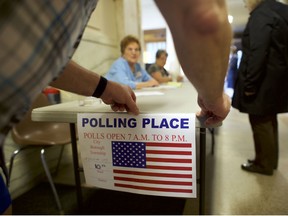Pennsylvania primaries crucial to Democratic hopes of winning House majority
The perennial battleground state also faces a governor's race and a Senate contest that Democratic incumbents are favoured to win, but which could become competitive

Article content
Democrats kept a close eye on Tuesday’s primaries in Pennsylvania, a pivotal state as the party seeks to make gains and possibly take control of the House in November’s midterm elections.
Opposition to President Donald Trump, a redrawn congressional map and a string of Republican retirements in the state have opened the door for Democrats to pick up as many as half a dozen seats. They need 23 to win the House majority.
But before party leaders can focus on general election campaigns, voters must settle some divisive and crowded primaries. Polls opened at 7 a.m.
Pennsylvania voters have swung back and forth in recent races. In 2016, Trump became the first Republican presidential nominee to win the state in 28 years. Earlier this year, Democrat Conor Lamb won a special election in a Pittsburgh-area district where Trump had defeated Hillary Clinton by 20 percentage points.
A perennial battleground state, Pennsylvania also faces a governor’s race and a Senate contest that Democratic incumbents are favored to win but could become competitive. Trump recorded an 11th-hour robo-call for his preferred Senate candidate, Republican Rep. Lou Barletta.
Voters headed to the polls Tuesday in four states where primary outcomes will provide fresh signs about voters’ mood less than six months before Election Day. In addition to Pennsylvania, Nebraska, Idaho and Oregon are holding nominating contests.

In Pennsylvania, the retirement of Republican Rep. Ryan Costello, the resignation of Republican Rep. Patrick Meehan and the revised map ordered by the state Supreme Court have led the GOP to effectively cede two districts in the Philadelphia area.
In one of the districts, Democrats are facing a competitive, crowded primary in which Sen. Bernie Sanders, I-Vt., endorsed a candidate, irking the backers of one of his opponents. Sanders also picked sides in an Allentown-area district that Democrats are aiming to pick up in November.
Elsewhere, Democrats are trying to unseat Republican Rep. Brian Fitzpatrick, who is running for re-election in a swing district. Wealthy philanthropist Scott Wallace and military veteran Rachel Reddick are the leading candidates in the Democratic primary.
Republican Rick Saccone, who lost to Lamb, is seeking redemption in a Pittsburgh-area district that favors the GOP. He has one primary challenger. Lamb has opted to run in a different district near Pittsburgh that is less conservative. He will face Republican Rep. Keith Rothfus in November.
In the Pennsylvania Senate race, incumbent Democratic Sen. Robert Casey awaits a possible showdown with Barletta. The Republican got a late boost from Trump, who called him a “very special guy” in the robo-call.
“Lou Barletta was one of the very first people to get behind me in Pennsylvania,” Trump says in the recording. “He was with me early on, before everyone else started jumping on board.”

Democratic Gov. Tom Wolf will face the winner of a crowded Republican primary that state Sen. Scott Wagner is favored to win. There are contested primaries for lieutenant governor in both parties.
Sanders endorsed Braddock, Pennsylvania, Mayor John Fetterman, who is running on universal health care and marijuana legalization, over Lt. Gov. Mike Stack, a Democrat. It’s one of several races where left-wing candidates are trying to replace incumbent Democrats; in Pittsburgh, two longtime lawmakers are being challenged by self-identified Democratic Socialists.
“It’s about filling office after office with people who can make these priorities a reality some day,” Fetterman said.
In Idaho, a competitive Republican primary for governor features three leading candidates: Rep. Raúl R. Labrador, a founding member of the hard-right House Freedom Caucus; Lt. Gov. Brad Little, who has the support of outgoing Gov. C.L. “Butch” Otter; and Tommy Ahlquist, a businessman and physician who has the support of 2012 presidential nominee Mitt Romney.
The leading Democratic candidates are Paulette Jordan, a former state lawmaker who would be the country’s first Native American governor; and A.J. Balukoff, the party’s 2014 nominee.
“People are ready for something new,” Jordan said in an interview. “I’m not about the party; I’m not about the system.”

Nebraska’s Republican senator and governor are favored to keep their seats in November. They will find out who their Democratic opponents will be after Tuesday’s primary.
In Nebraska’s 2nd Congressional District, a pickup opportunity for Democrats, former congressman Brad Ashford is seeking a comeback against nonprofit executive Kara Eastman. The winner of their primary will face Republican Rep. Don Bacon.
In Oregon, incumbent Democratic Gov. Kate Brown has drawn a pair of primary challengers but is expected to advance to the general election. The race has attracted a crowded field of Republicans.
Oregon is a heavily Democratic state, and Brown is favored to retain the governorship.
Our website is the place for the latest breaking news, exclusive scoops, longreads and provocative commentary. Please bookmark nationalpost.com and sign up for our daily newsletter, Posted, here.






Postmedia is committed to maintaining a lively but civil forum for discussion. Please keep comments relevant and respectful. Comments may take up to an hour to appear on the site. You will receive an email if there is a reply to your comment, an update to a thread you follow or if a user you follow comments. Visit our Community Guidelines for more information.